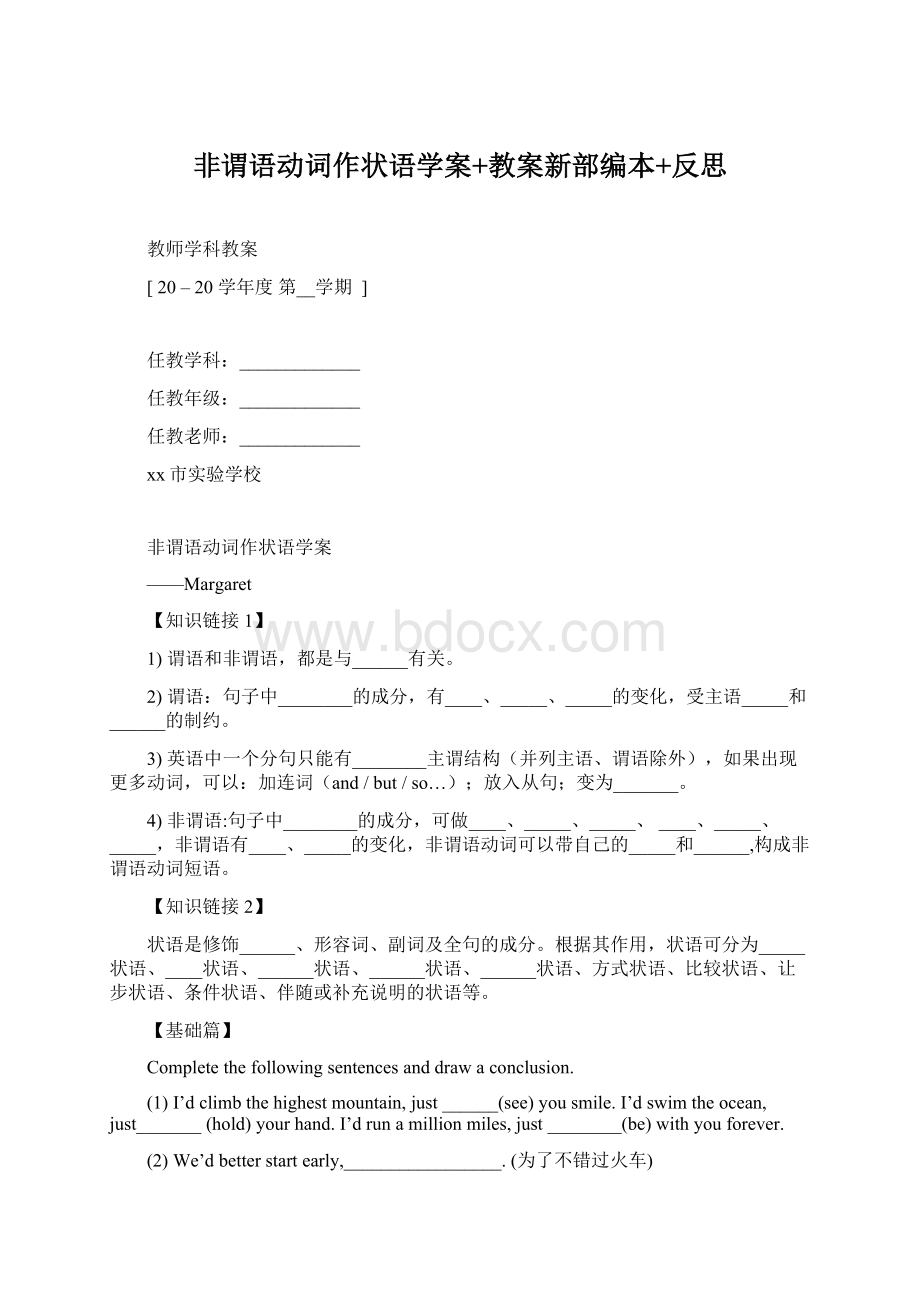非谓语动词作状语学案+教案新部编本+反思.docx
《非谓语动词作状语学案+教案新部编本+反思.docx》由会员分享,可在线阅读,更多相关《非谓语动词作状语学案+教案新部编本+反思.docx(11页珍藏版)》请在冰豆网上搜索。

非谓语动词作状语学案+教案新部编本+反思
教师学科教案
[20–20学年度第__学期]
任教学科:
_____________
任教年级:
_____________
任教老师:
_____________
xx市实验学校
非谓语动词作状语学案
——Margaret
【知识链接1】
1)谓语和非谓语,都是与______有关。
2)谓语:
句子中________的成分,有____、_____、_____的变化,受主语_____和______的制约。
3)英语中一个分句只能有________主谓结构(并列主语、谓语除外),如果出现更多动词,可以:
加连词(and/but/so…);放入从句;变为_______。
4)非谓语:
句子中________的成分,可做____、_____、_____、____、_____、_____,非谓语有____、_____的变化,非谓语动词可以带自己的_____和______,构成非谓语动词短语。
【知识链接2】
状语是修饰______、形容词、副词及全句的成分。
根据其作用,状语可分为_____状语、____状语、______状语、______状语、______状语、方式状语、比较状语、让步状语、条件状语、伴随或补充说明的状语等。
【基础篇】
Completethefollowingsentencesanddrawaconclusion.
(1)I’dclimbthehighestmountain,just______(see)yousmile.I’dswimtheocean,just_______(hold)yourhand.I’drunamillionmiles,just________(be)withyouforever.
(2)We’dbetterstartearly,_________________.(为了不错过火车)
考点小结:
1.______________________________________________________________________________
2.______________________________________________________________________________
3.______________________________________________________________________________
(3)Wehurriedtotherailwaystation,only_______(find)thetrainhadjustleft.
(4)Theymistookmeforarobber,________(cause)mesomeembarrassment.
(5)Hefired,________(kill)oneoftheenemies.
考点小结:
4.______________________________________________________________________________
(6)Shelookssobeautifulas_________(attract)allofus.
(7)Theteaistoohot________(drink)=Theteaisnotenoughcold________(drink)
考点小结:
5.______________________________________________________________________________
(8)Weweresurprised__________(find)themaninragswasactuallyamillionaire.
考点小结:
6.______________________________________________________________________________
(9)___________(know)Englishwell,hetranslatedthearticlewithoutadictionary.
(10)___________(give)moretime,hewouldbeabletodoitbetter.
考点小结:
7.______________________________________________________________________________【课后作业1】
Completethefollowingsentenceswiththeproperformsofthewordsgiven.
(1)_________(avoid)criticism,donothing,saynothing,benothing.
(2)Heliftedabigstone,only_______(drop)itonhisownfeet.
(3)Iamonlytoopleased_______(help)you.
(4)Youaretooready_____(find)faultswithotherpeople.
(5)Wearenevertooold_______(learn)
(6)Heishappyforhisdaughter_________(marry)awealthyman.
(7)Hesatinthechair________(read)newspapers.
(8)Shecameoutoftheroom,_________(follow)byherdog.
(9)Heearnsaliving_________(drive)atruck.
(10)__________(accompany)bytwoofhisfriends,hestillfeltunsafe.
【提高篇】
Completethefollowingsentencesanddrawaconclusion.
(1)___________(fail)manytimes,hedidn’twanttotryagain.
(2)__________(fail)toqualifyasadoctor,Itookupteaching.
(3)____________________(bit)twice,thepostmanrefusedtodeliverourlettersunlesswechainedourdogup.
(4)_____________________(separate)fromothercontinentsformillionsofyears,Australiahasmanyplantsandanimalsnotfoundinanyothercountriesintheworld
考点小结:
1.______________________________________________________________________________
(5)If______(arrive)byplane,pleaseletmysecretaryknow.
(6)Although________(live)milesaway,heattendedthecourse.
(7)Shelookedoutofthewindow,asthough________.(think)
(8)Though_______(tell)tostop,hekeptonwalking.
考点小结:
2.______________________________________________________________________________
(9)Whether________,wewillgofishingtomorrow.
=Ifweatherpermits,wewillgofishingtomorrow.
(10)Thelisteners___________________,thelecturebegan.
=Afterthelistenershadtakentheirseats,thelecturebegan.
考点小结:
3.______________________________________________________________________________
【课后作业2】根据下列信息点写一篇不少于120词的作文,注意非谓语和复合句的运用。
1.一天,一个乞丐在路边讨钱,但是李先生匆忙赶路上班,没有注意到那个乞丐。
2.结果这个乞丐很生气,伸出拐杖,差点把李先生绊倒了。
3.意识到他是个残疾人,李先生想给他一些钱。
4.于是他拿出了一张百元钞票,突然一阵风把钞票吹到了空中。
5.看到被风吹到空中的百元钞票,乞丐迅速跳起来去追那张钞票,使李先生非常惊讶。
______________________________________________________________________________
______________________________________________________________________________
______________________________________________________________________________
______________________________________________________________________________
______________________________________________________________________________
______________________________________________________________________________
______________________________________________________________________________
ReviewNon-finiteVerbUsedasAdverbial
MargaretinHefengHighSchool
Teachingtime:
1lesson
Teachingaims:
1.Getacrossthebasicknowledgeofnon-finiteverbusedasadverbialtostudents.
2.Makestudentshaveabetterunderstandingofsomespecialstructureofnon-finiteverbusedasadverbial.
3.Enablestudentstousenon-finiteverbasadverbialfreeyandcorrectlyinwriting,grammaticalfillingandcorrection.
TeachingProcedures:
Step1:
Warming-up:
Reviewsomebasicknowledgeofpredict,non-finiteverbandadverbialbydoingsomeexercisesandanalysing.
1.Completethefollowingsentenceswiththewordsgiven.
taken;wastaken;took
1Thedog_________tohospitalyesterday.
2Thedogwhich_________tohospitalyesterdayhaddevelopedararedisease.
3Thedoghaddevelopedararedisease,soitsmaster_________ittohospitalyesterday.
4Thedog_________tohospitalyesterdayhaddevelopedararedisease.
Keys:
wastaken;wastaken;took;taken
知识链接1:
谓语和非谓语,都是与动词有关。
谓语:
句子中不可或缺的成分,有时态、语态、语气的变化,受主语人称和数的制约。
英语中一个分句只能有一个主谓结构(并列主语、谓语除外),如果出现更多动词,可以:
加连词(and/but/so…);放入从句;变为非谓语。
非谓语:
句子中不做谓语的成分,可做主语、宾语、表语、定语、状语、补语,非谓语有时态、语态的变化,非谓语动词可以带自己的状语和宾语,构成非谓语动词短语。
2.Tellthefunctionsoftheaddedparts.
Havingplayedmobilephonegamesthewholenight,thesedayshewouldalwayssitintheclassroom,thinkingofnothingtoescapetheresponsibilityofstudy.
Keys:
动作的原因;动作的时间;动作的频度;动作的地点;动作的补充/伴随;动作的目的。
知识链接2:
状语是修饰动词、形容词、副词及全句的成分。
根据其作用,状语可分为时间状语、地点状语、原因状语、目的状语、结果状语、方式状语、比较状语、让步状语、条件状语、伴随或补充说明的状语等。
Step2:
Checkhomeworkandconcludetheusageoftodo,doinganddoneusedasadverbial.
Completethefollowingsentencesanddrawaconclusion.
(1)I’dclimbthehighestmountain,just______(see)yousmile.I’dswimtheocean,just_______(hold)yourhand.I’drunamillionmiles,just________(be)withyouforever.
我愿意翻越最高的山脉,就是为了目睹你的微笑;
我愿意横渡海洋,就是为了与你牵手;
我愿意跨越万里,只是为了与你永远共度此生。
(2)We’dbetterstartearly,_________________.(为了不错过火车)
Keys:
tosee;tohold;tobe;soasnotto/inordernottomissthetrain.
考点小结:
1.作目的状语,用动词不定式,置于句首、句末均可。
2.为了强调目的,还可以用inorderto或soasto(只能放在句中)。
3.不定式作目的状语,其否定式为inordernotto或soasnotto,而不能单独用notto.
(3)Wehurriedtotherailwaystation,only_______(find)thetrainhadjustleft.
(4)Theymistookmeforarobber,________(cause)mesomeembarrassment.
(5)Hefired,________(kill)oneoftheenemies.
Keys:
tofind;causing;killing.
考点小结:
4.做结果状语时,(only)todo表示‘出乎意料,意料之外’的结果,(thus)doing表示‘顺其自然,意料之中’的结果。
(6)Shelookssobeautifulas_________(attract)allofus.
(7)Theteaistoohot________(drink)=Theteaisnotenoughcold________(drink)
Keys:
toattract;todrink;todrink
考点小结:
5.不定式作结果状语,常常有以下四类结构:
①onlytodo表示意料之外的结果;②so+adj/adv+astodo/suchastodo③too+adj/adv+todo④adj/adv+enoughtodo.
(8)Weweresurprised__________(find)themaninragswasactuallyamillionaire.
Keys:
tofind
考点小结:
6.不定式作原因状语,常常表示产生某种感情的原因,放在glad,delighted,surprised,excited,satisfied等表示情感的词后面。
(9)___________(know)Englishwell,hetranslatedthearticlewithoutadictionary.
(10)___________(give)moretime,hewouldbeabletodoitbetter.
Keys:
Knowing;Given;
考点小结:
7.doing/done作状语,首先要判断分词所表示的动作和它的逻辑主语(常常是句子主语)之间的关系,如果和句子主语构成逻辑主谓关系,则用doing,如果和句子主语构成逻辑动宾关系,则用done。
Step3:
Askstudentstotrytousenon-finiteverbasadverbialtocompletesomejokes.
HaveATasteofHumor
Jack:
Tom,___________________,Istoppedhim,whatvirtue(美德)wouldIbeshowing?
Jack:
汤姆,如果我看见有人在殴打(beat)一头驴(donkey),我制止了他,我显示出了什么美德?
Tom:
Brotherlylove?
汤姆:
兄弟般的关爱吧?
Keys:
seeingamanbeatingadonkey
Tom闭着眼睛站在镜子前,他设法想看看他睡着时是什么样。
Tomisstandinginfrontofamirrorwithhiseyesshut,_______________whathelookslikewhenhe’sasleep.
Key:
tryingtosee
Tom:
____________________,thedoctorgivesmethesethreepills.Thisredone’sforbeforedinner.Thatgreenone’sforafterdinner.
Tom:
为了帮助我减肥,医生给了我这3颗药丸,红的饭前吃,绿的饭后吃。
Jack:
Andwhat’sthepinkonefor?
Jack:
那粉红的干什么用?
Tom:
Thepinkoneisdinner.
Tom:
粉红的是饭。
Key:
Tohelpmeloseweight
Teacher:
Whyareyoulateforschooleverymorning?
Tom:
EverytimeIcometothecorner,Ialwaysseeasign__________(say)“School-Goslow".
Key:
saying
老师:
为什么你每天早晨都迟到?
汤姆:
每当我经过学校的拐角处,
僦看见一个牌子上写着"学校----慢行".
Mistress:
Becarefulnottodropthosechinadishes.
Maid:
Don’tworry,madam.Iftheydidfalltheyaretoolight__________.
Key:
tohurtmyfeet
女主人:
小心,不要摔掉了那些瓷器。
女仆人:
别担心,夫人。
即使它们掉下来也不会伤着我的脚的,因为它们很轻。
Step4:
Checkhomeworkandconcludetheusageofhavingdone/havingbeendoneandotherspecialstructuresusedasadverbial.
Completethefollowingsentencesanddrawaconclusion.
(1)___________(fail)manytimes,hedidn’twanttotryagain.
(2)__________(fail)toqualifyasadoctor,Itookupteaching.
(3)____________________(bit)twice,thepostmanrefusedtodeliverourlettersunlesswechainedourdogup.
(4)_____________________(separate)fromothercontinentsformillionsofyears,Australiahasmanyplantsandanimalsnotfoundinanyothercountriesintheworld
Keys:
Havingfailed;Havingfailed;Havingbeenbitten;Havingbeenseparated.
考点小结:
1.havingdone强调动作发生在主句谓语动作之前且是经过一段时间间隔之后,谓语动词才可能发生。
它还可以指动作是在谓语动作之前多次发生过。
havi